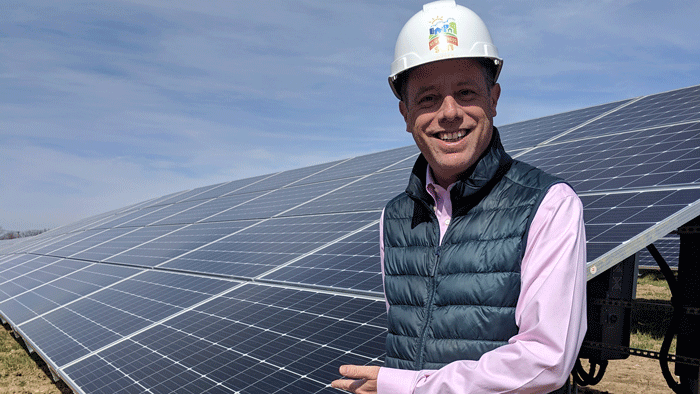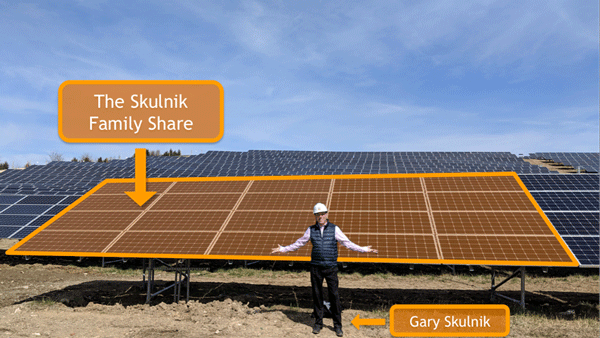
Officials, communities and businesses know renewable sources of energy, like solar, are essential to meeting the state’s climate goals as established in the Climate Solutions Now Act of 2022. The 2022 act requires the state to achieve net zero greenhouse gas emissions by 2024 and reduce greenhouse gas emissions to levels 60% lower than they were in 2006 by 2031.
As these dates loom, the United States continues to take steps in the right direction. According to industry analyst company EY, in 2022 “the U.S. installed 23.6GW of solar capacity, a 19% increase from 2020.” While this increase is a great start, many renters and homeowners are running into obstacles.
Unfortunately, 80% of Americans can’t put solar panels on their roofs. In response, innovative businesses continue to develop, resulting in the continued creation of opportunities like community solar.
Community solar allows utility customers who rent their homes or are otherwise unable to utilize rooftop solar panels to power their households with solar energy through a subscription arrangement with a community solar project. For this reason, community solar is more accessible to low- and moderate-income households. Plus, the credits provided to subscribers for using community solar impact the subscriber’s bill in the same way that electricity produced by rooftop solar impacts the homeowner’s bill.
This year, the Maryland General Assembly passed a bill that makes the Community Solar Energy Generating Systems Pilot Program permanent. With the passing of this bill, Maryland is the 23rd state to implement a shared-access community solar framework.
Additionally, as of 2022, 43 community solar projects operate across Maryland, several of which are held by Neighborhood Sun, a community solar company based in Silver Spring, Maryland, that is focused on reducing the carbon footprint while creating equitable access to solar energy by connecting solar farm developers with local individuals and businesses looking for access to affordable solar energy.
“Community solar expands access to Maryland residents with low- to moderate-income who never had access to solar energy in the past. The program is virtual. There are no wires, but customers can connect with projects in their area and earn credits on their energy bill,” states Gary Skulnik, CEO and founder of Neighborhood Sun.
According to the Office of People’s Counsel for the State of Maryland, subscribers who can access community solar projects include “any utility customer of BGE, Delmarva Power, Pepco, or Potomac Edison with an electric meter account…[who are also] physically located in the same utility territory as the solar project to which they are subscribing.”
neighborhood sun - gary skulnik
Skulnik’s Mission to Move Maryland Towards Cleaner Energy

Skulnik has 23 years of experience in the clean climate industry and led the charge to get Maryland to adopt its first Renewable Energy Portfolio Standard (“RPS”). This standard requires electricity suppliers to fill a minimum of their electricity sales with energy from renewable sources. The RPS allows for the sale and transfer of renewable energy credits (“RECs”) where individuals and companies interested in installing a qualifying source of energy can sell their RECs to an electricity supplier. If an electricity supplier does not comply with the minimum requirements, it will have to pay a financial penalty.
In 2004, the bill was modest, requiring only 7.5% of the state’s electricity to come from renewables, but it took three years to get it passed, Skulnik says. Since then, he reports a reduced reliance on coal-fired power plants in Maryland, a change that has improved air quality for lower-income communities.
Skulnik reiterates his excitement about the future of clean energy and explains that “solar is one of the cleanest sources of energy though the cleanest energy is the energy we don’t use.”
However, with advances in storage capabilities, wind, solar and motion-powered sources—like wave energy— are becoming more effective, making a future of clean energy even more feasible.
He adds, “Marylanders care about a cleaner, greener environment. It’s a great place to do business – small enough to have impact at the highest levels. Every administration over the last 20 years in my work has been supportive of clean energy.”
Neighborhood Sun and Their Impact Today
Today, Neighborhood Sun manages community solar projects in New Jersey, New York, Maine, Minnesota, Massachusetts, and Colorado, in addition to those in Maryland and the District of Columbia.
The company is a certified B corporation that partners with more than 30 local community organizations, churches and synagogues to build more awareness for community solar while also raising funds for those organizations.
Skulnik shares in his 2022 Impact Report that “lower-income households typically contribute the least to climate change but are impacted disproportionately by its harmful economic and health effects. Transitioning to clean energy is an opportunity to democratize our energy system and make sure it’s helping communities instead of harming them…Thanks to accessible clean energy solutions like community solar, it’s now an option for all utility customers – not just the households who are eligible for rooftop panels – to benefit from solar energy through a simple subscription format.”
In May, Neighborhood Sun closed a significant first round of funding; the $1.5 million round was led by the Maryland Technology Development Corporation (TEDCO).
“There is a gap in funding opportunities between angel investors and VCs and TEDCO fills that, galvanizing local investment for companies like ours. We are a healthy, local start-up focused on clean energy. TEDCO provides additional support that other types of investors don’t. They are a good resource and continue to help us get our name out there,” states Skulnik.
As shared in a press release from TEDCO, Katherine Hill Ritchie, senior director of Venture Funds at TEDCO states, “By connecting individuals to solar farms, Neighborhood Sun helps to provide a versatile eco-friendly energy solution to the public. This technology solution benefits not only the individuals looking to use cleaner energy, but also the environment by creating less energy pollution, reducing the carbon footprint and creating more green jobs which, in turn, helps to promote a necessary transition to renewable energy.”
TEDCO CEO, Troy LeMaile-Stovall, states, “As the economic engine for Maryland technology companies, TEDCO is in a unique position to provide support for businesses who are working to create more opportunities for equity and accessibility, businesses like Neighborhood Sun. We hope that, through the opportunities Neighborhood Sun provides to renters and low- to moderate-income households, our investment will make a difference in supporting Maryland’s goals and creating equitable energy access.”
Source: I95Business